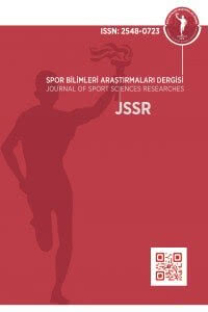Sporcularda Duygusal Zekâ ve Hedef Bağlılığı Düzeyleri Arasındaki İlişkinin Araştırılması
Duygusal zeka, Hedef Bağlılığı, Lig statüsü, Takım, Bireysel
Study of The Relationship Between Emotional Intelligence and Goal Commitment Levels in Athletes
Emotional Intelligence, Goal Commitment, League Status, Team, Individual,
___
- Adiloğulları, İ. & Görgülü, R. (2015). Sporda duygusal zekâ envanterinin uyarlama çalışması. Uluslararası Spor, Egzersiz ve Antrenman Bilimi Dergisi, 1(2),83-94. DOI: 10.18826/ijsets.05333.
- Aydoğdu, C., Şahan A. K. & Erman A. (2017). Genç tenisçilerde spora özgü başarı motivasyon düzeyinin müsabaka performansı üzerine etkisinin incelenmesi. Abant İzzet Baysal Üniversitesi Eğitim Fakültesi Dergisi, 18(2), 655-666. https://doi.org/10.17240/aibuefd.2018..-431408.
- Aube, C. & Roussea, V. (2005). Team goal commitment and team effectiveness: The role of task interdependence and supportive behaviors. Group Dynamics Theory Research and Practice, 9(3),189-204. DOI: 10.1037/1089-2699.9.3.189.
- Büyüköztürk, Ş. (2017). Sosyal bilimler için veri analizi Kitabı (23. Baskı). Pegem Akademi: Ankara.
- Civanoğlu, S. P. (2015). Duygusal zekâ ile tükenmişlik ve örgütsel bağlılık düzeyleri arasındaki ilişkinin incelenmesi üzerine bir araştırma. Yükseklisans Tezi. Beykent üniversitesi, İstanbul.
- Cooper, R. K. & Sawaf, A. (1997). Executive EQ: Emotional intelligence in business. London: Orion Business Books.
- Garland, D.J. & Barry, J.R. (1988). The effects of personality and perceived leader behaviors on performance in collegiate football. The Psychological Record, 38(2), 237-247.
- Hollenbeck, J. R., Klein, H. J., O'Leary, A. M. & Wright, P. M. (1989). Investigation of the construct validity of a self-report measure of goal commitment. Journal of Applied Pyschology,74(6), 951-956. http://dx.doi.org/10.1037/0021-9010.74.6.951.
- Jackson, D. N. (1974). Personality Research Form Manual. Port Huron, MI: Research Psychologist Press.
- Jiang, Z. (2016). Emotional intelligence and career decision-making self-efficacy: Mediating roles of goal commitment and professional commitment. Journal of Employment Counseling, 53(1), 30-47. Doi:10.1002/joec.1202.
- KED. (2014). Goals vs. commitment: which matters most?. KED. Retrieved from: http://www.kelbyergodesign.com/blog/2014/06/23/goals-vs-commitment-which-mattersmost.
- Klein, H. J., Wesson, M. J., Hollenbeck, J. R. & Alge, B. J. (1999). Goal commitment and the goal-setting process: Conceptual clarification and empirical synthesis. Journal of Applied Psychology,84(6),885-896. http://dx.doi.org/10.1037/0021-9010.84.6.885.
- Klein, H. J., Wesson, M. J., Hollenbeck, J.R., Wright, P.M. & Deshon, R.P. (2001). The assessment of goal commitment: A measurement model meta-analysis. Organizational Behavior and Human Decision Processes,85(1), 32-55. Doi: 10.1006/obhd.2000.2931.
- Klein, H.J. & Wright, P. (1994). Antecedents of goal commitment: An empirical examination of personal and situational factors. Journal of Applied Social Psychology, 24(2), 95-114. DOI: 10.1111/j.1559-1816.1994.tb00560.x.
- Lane, A.M., Devonport, T.J., Davies, K.A., Wilson, M., Meyer, B.B., Diehl, C.D.P., Thelwell, R. & Weston, N.(2009).Validity of the emotional intelligence scale for use in sport. Journal of Sport Sciences & Medicine, 8(2), 289–295.Acquired from.https://www.ncbi.nlm.nih.gov/pmc/articles/PMC3761491/.
- Larsen, D.W. (1983). Coach inspires more than winning. Seattle, Washington, U.S: Seattle Times.
- Latham, G.P. & Locke, E.A. (1991). Self regulation with goal setting. Organizational Behavior and Human Decision Processes, 50(2), 212-247. https://doi.org/10.1016/0749-5978(91)90021-K.
- Locke, E.A., Shaw, K.N., Saari, L. M. & Latham, G.P. (1981). Goal setting and task performance: 1969-1980. Psychological Bulletin, 90(1), 125-152. DOI:10.1037//0033-2909.90.1.125.
- Salman, M. N., Toros T. ve Soylu Y. (2018). Elit sporcuların duygusal zekâ yönünden karşılaştırılması: Takım ve bireysel sporlar. Turkish Studies, 13(26), 1021-1036. DOI: 10.7827/TurkishStudies.14442.
- Salovey, P. & Mayer, J. D. (1990). Emotional Intelligence. Imagination, Cognition and Personality, 9, 185-211. http://dx.doi.org/10.2190/DUGG-P24E-52WK-6CDG.
- Tabachnick, B. G. & Fidell, L. S. (2015). Çok değişkenli istatistiklerin kullanımı (Çev. Ed. M. Baloğlu). Ankara: Nobel Akademik.
- Taghizadeh, F. & Shojaie, M. (2012). Comparing emotional intelligence and team cohesion of elite and amateur table tennis players. Advances in Applied Science Research, 3(6), 3633-3639.
- Tok, S. (2008). Performans sporcusu ve spor yapmayan üniversite öğrencilerinde duygusal zekâ ile kişilik özelliklerinin karşılaştırılması. Doktora tezi. Ege Üniversitesi, Sağlık Bilimler Enstitüsü, İzmir.
- Walliman, N. (2001). Your Research Project: A Step by Step Guide for the First Time Researcher. London: Sage, Thousand Oaks.
- ISSN: 2548-0723
- Yayın Aralığı: Yılda 3 Sayı
- Başlangıç: 2016
- Yayıncı: Kadir YILDIZ
Profesyonel Futbol Takımı Seyircilerinin Bağlılık Noktalarının İncelenmesi
Erdinç DEMİRAY, Volkan UNUTMAZ
Vahid SARİ-SARRAF, Nazila PARNİAN-KHAJEHDİZAJ, Ramin AMİRSASAN
Farklı Dayanıklılık Antrenmanlarında Oluşan Sıvı Kaybının İncelenmesi
Mehmet BABUR, Hakan YARAR, Hasan İŞLEK, Volkan ŞUBATLIOĞLU, Gülnur TEMELLİ
Yenilenen Beden Eğitimi ve Spor Öğretimi Programlarının Uluslararası Politikalar Kapsamında Analizi
MİNE MÜFTÜLER, Canan KOCA ARITAN
Yücel MAKARACI, Melek GÜLER, Melek KOZAK, Ömer PAMUK, Recep SOSLU
Gençlik ve Spor İl Müdürlükleri Çalışanlarının Mantar Yönetimi Algı Düzeyleri Üzerine Bir Araştırma
Ortaokul Öğrencileri için Voleybol Tutum Ölçeğinin Geliştirilmesi
Besinsel Destek Kullanımı: Voleybol Örneği
Gülbin RUDARLI NALÇAKAN, Didem AKINCI, Yeliz YOL, Esin ERGİN
